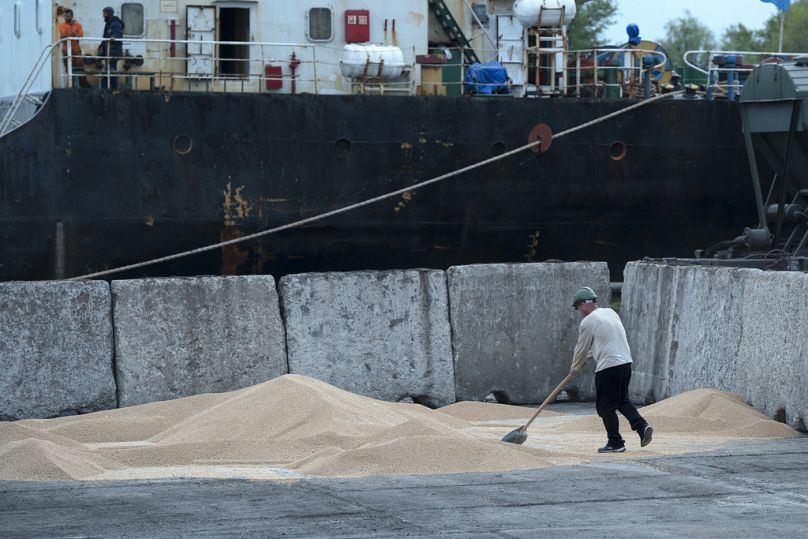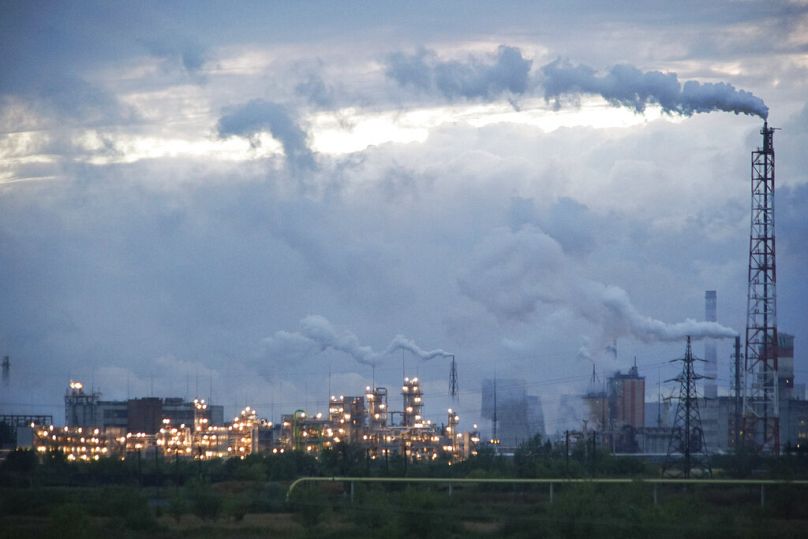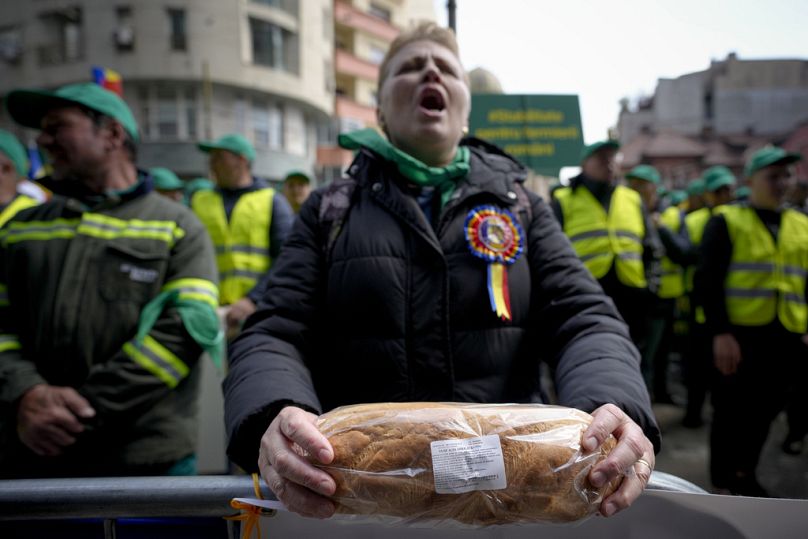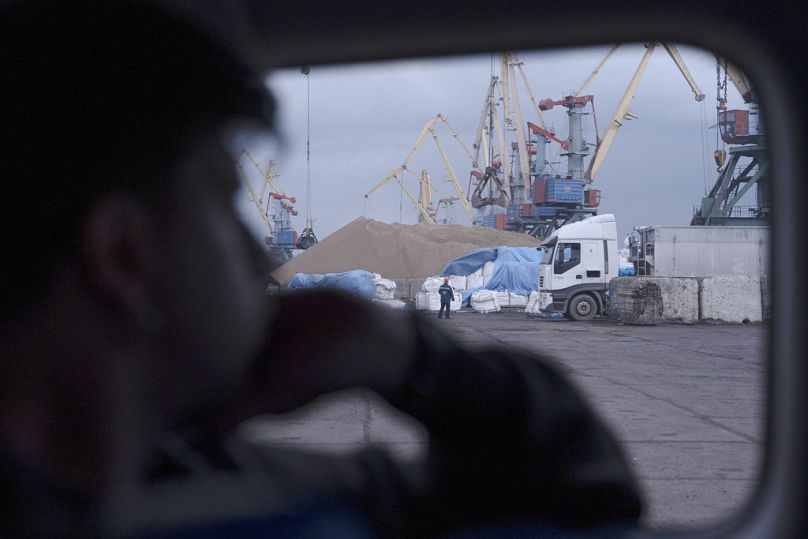Failures to rethink and redo how Ukraine gets its grain out of the country would gravely undermine the war effort and security in Europe, Cristian Gherasim writes.
Over the past two weeks, we kept seeing reports that Hungary, Poland, Slovakia, and Bulgaria have either imposed bans on tariff-free Ukrainian grains or are very inclined to do so.
 ADVERTISEMENT
ADVERTISEMENT
 ADVERTISEMENT
ADVERTISEMENT
And the timing couldn’t be worse. Russia is threatening to kill the Black Sea grain deal if its demands aren’t met.
The deal, which has seen some 28 million metric tonnes of Ukrainian grain being exported, is due to expire on 18 May, and Russia appears keen to milk every concession possible before discussing a renewal.
The onset of Moscow's war saw the price of grain shooting up as countries feared that Ukraine — the world’s second-largest grain producer — would be unable to get its goods out.
Over the summer, the Black Sea Grain Initiative was brokered by the UN and Turkey, lifting the Kremlin’s maritime blockade that halted Ukraine's grain exports in the months after the invasion, alleviating fears of a worldwide food crisis.
While things appeared to have normalized a bit, the issue has now resurfaced, taking a new level of complexity, not seen since the start of the war.
How did we get here?
Russia’s agreement to take part in the Black Sea Grain Deal was never about helping nations deal with food shortages but about gaining advantage — making countries reliant on the deal, delaying any efforts to seek alternative routes and then extorting Europe and its allies to give in to various concessions.
One could argue that the deal acted like Russia’s Trojan horse — made out to look harmless but toxic to Ukraine and Europe’s security.
The signs of such a ploy began to emerge after last month’s renewal of the deal.
During the 23-24 March European Council meeting, Antonio Guterres, the UN's secretary general, declared that Russia had become less cooperative in recent weeks, and he was not at all sure that the Black Sea Grain Initiative could be secured in the future.
Russia's foreign ministry announced that a further decision to extend the initiative would hinge on the implementation of several Russian demands.
What about the stolen pipeline?
Along with the lifting of a ban on transactions through the international SWIFT payment system and the resumption of supplies of machinery and spare parts, removing sanctions on fertilising companies became a recurring theme.
Namely, Russia is adamant about the reopening of the “Togliatti-Odessa” ammonia pipeline.
The pipeline carried about 2.3 million tonnes of ammonia yearly from the TogliattiAzot plant in Russia to Odesa.
Shortly before the invasion of Ukraine, TogliattiAzot and all of its assets were stolen in an armed raid undertaken by sanctioned Russian oligarch Dmitry Mazepin with support from the Russian government.
The illegal raid remains subject to a major ongoing lawsuit in Ireland. If reopened, the pipeline will bring an estimated revenue of over $3 billion (€2.7bn) yearly to Russia’s war chest and its efforts to wage war on Ukraine and Europe.
Are there any solutions?
Russia offered short-term extensions of the deal — a mere 60 days — to keep everyone busy, incentivised and away from looking for alternatives.
With Ukraine threatened with import tariffs and Turkey weakened by internal woes, Russia is ratcheting up the pressure on Europe and Ukraine’s allies to give into its demands.
Cutting the dependency on a Russian-sponsored trade deal is the only way out.
Ukraine, together with its allies, should have been exploring alternative routes from day one and limiting dependency on the Black Sea Grain Deal, but not all is lost.
Romania has already taken important steps to aid Ukrainian exports by not joining Bulgaria, Hungary, Poland and Slovakia in banning food imports from Ukraine.
Barges on the Danube would take grain to Central Europe or the Romania Black Sea port of Constanta.
Some small steps have been taken in the search for alternatives with the reopening of the Berezyne-Basarabeasca railway connection between Ukraine and Moldova in June 2022, which will be used to export Ukrainian cargo.
What can Brussels do?
The EU needs to step in and help with further railroad developments, namely proper connections throughout the continent.
Currently, the main problem with railways connecting the EU and Ukraine for exports is that the gauge of train tracks in post-Soviet states like Ukraine is 92mm wider than in the EU.
Additionally, the EU can waive its CO2 limits for heavy goods vehicles proposed in 2023 since many Ukrainian trucks do not meet neighbouring states’ ecological standards as they currently stand.
Failures to rethink and redo the way Ukraine gets its grain out of the country would gravely undermine the war effort and security in Europe.
It should come as no surprise that Russia’s demands would only grow in number and audacity as time goes by and as the world becomes reliant on the bluff that is the Black Sea grain deal.
Cristian Gherasim is an analyst, consultant and journalist with over 15 years of experience focusing on Eastern and Central European affairs.
At Euronews, we believe all views matter. Contact us at view@euronews.com to send pitches or submissions and be part of the conversation.














